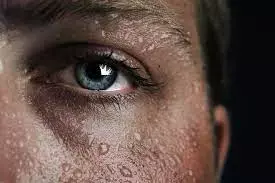- Home
- Medical news & Guidelines
- Anesthesiology
- Cardiology and CTVS
- Critical Care
- Dentistry
- Dermatology
- Diabetes and Endocrinology
- ENT
- Gastroenterology
- Medicine
- Nephrology
- Neurology
- Obstretics-Gynaecology
- Oncology
- Ophthalmology
- Orthopaedics
- Pediatrics-Neonatology
- Psychiatry
- Pulmonology
- Radiology
- Surgery
- Urology
- Laboratory Medicine
- Diet
- Nursing
- Paramedical
- Physiotherapy
- Health news
- Fact Check
- Bone Health Fact Check
- Brain Health Fact Check
- Cancer Related Fact Check
- Child Care Fact Check
- Dental and oral health fact check
- Diabetes and metabolic health fact check
- Diet and Nutrition Fact Check
- Eye and ENT Care Fact Check
- Fitness fact check
- Gut health fact check
- Heart health fact check
- Kidney health fact check
- Medical education fact check
- Men's health fact check
- Respiratory fact check
- Skin and hair care fact check
- Vaccine and Immunization fact check
- Women's health fact check
- AYUSH
- State News
- Andaman and Nicobar Islands
- Andhra Pradesh
- Arunachal Pradesh
- Assam
- Bihar
- Chandigarh
- Chattisgarh
- Dadra and Nagar Haveli
- Daman and Diu
- Delhi
- Goa
- Gujarat
- Haryana
- Himachal Pradesh
- Jammu & Kashmir
- Jharkhand
- Karnataka
- Kerala
- Ladakh
- Lakshadweep
- Madhya Pradesh
- Maharashtra
- Manipur
- Meghalaya
- Mizoram
- Nagaland
- Odisha
- Puducherry
- Punjab
- Rajasthan
- Sikkim
- Tamil Nadu
- Telangana
- Tripura
- Uttar Pradesh
- Uttrakhand
- West Bengal
- Medical Education
- Industry
Age-related macular degeneration linked to development of depression among elderly

The risk of depression in the elderly that is exacerbated by the presence of age-related macular degeneration suggests a recent study published in the BMC Ophthalmology.
Visual acuity (VA) loss has been associated with depression in patients with age-related macular degeneration (AMD). However, previous studies did not incorporate subgroups of age-related macular degeneration when correlating Visual acuity and mental health. The goal of this study was to describe the relationship between Visual acuity and mental health questions in patients with different classifications of age-related macular degeneration, and to identify associations of mental health subscale scores.
AMD patients classified by multi-modal imaging were recruited into an age-related macular degeneration registry. Habitual VA was obtained by ophthalmic technicians using the Snellen Visual acuity at distance. At enrollment, patients completed the NEI-VFQ-25, which includes 25 questions regarding the patient's visual functionality. Median with interquartile-range (IQR) scores on the mental health subscale of the VFQ were calculated by age-related macular degeneration classification and Visual acuity groups. Univariate and multivariable general linear models were used to estimate associations between mental health scores and variables of interest.
Results:
- Eight hundred seventy-five patients were included in the study. Patients with bilateral geographic atrophy (GA) or bilateral GA and neovascular (NV) age-related macular degeneration scored lowest on the mental health subscales with a median (IQR) of 58.2 (38–88) and 59.3 (38–88).
- When stratified by Visual acuity, patients with a habitual Visual acuity of 20/200 or worse scored the lowest on mental health subscales scores: median of 43.8
- Patients with a Visual acuity of 20/20 scored the highest: 87.5
- Habitual Visual acuity of the better- and worse-seeing eye and age-related macular degeneration classification were significantly associated with mental health subscale scores (all p < 0.0001 in both the univariate and multivariable analysis, except the Visual acuity of the worse-seeing eye in multivariable model p = 0.027).
- Patients enrolled during the COVID pandemic had mental health scores that were 2.7 points lower than prior to the pandemic, but this difference was not significant in univariate or multivariable analysis
There is a significant association between mental health questionnaire scores and age-related macular degeneration classification, as well as Visual acuity in both the better and worse-seeing eyes in patients with age-related macular degeneration. It is important for clinicians to recognize feelings of worry/ frustration in these patients, so they can be appropriately referred, screened, and treated for mental health problems.
Reference:
Fonteh, C.N., Mathias, M.T., Mandava, N. et al. Mental health and visual acuity in patients with age-related macular degeneration. BMC Ophthalmol 22, 391 (2022). https://doi.org/10.1186/s12886-022-02602-9
Keywords:
Age-related macular degeneration, Mental health, Retina, Vison function questionnaires, Fonteh, C.N., Mathias, M.T., Mandava, N.,
Dr. Shravani Dali has completed her BDS from Pravara institute of medical sciences, loni. Following which she extensively worked in the healthcare sector for 2+ years. She has been actively involved in writing blogs in field of health and wellness. Currently she is pursuing her Masters of public health-health administration from Tata institute of social sciences. She can be contacted at editorial@medicaldialogues.in.
Dr Kamal Kant Kohli-MBBS, DTCD- a chest specialist with more than 30 years of practice and a flair for writing clinical articles, Dr Kamal Kant Kohli joined Medical Dialogues as a Chief Editor of Medical News. Besides writing articles, as an editor, he proofreads and verifies all the medical content published on Medical Dialogues including those coming from journals, studies,medical conferences,guidelines etc. Email: drkohli@medicaldialogues.in. Contact no. 011-43720751


